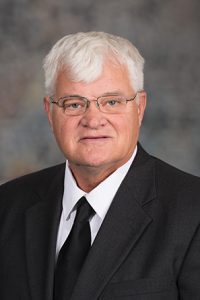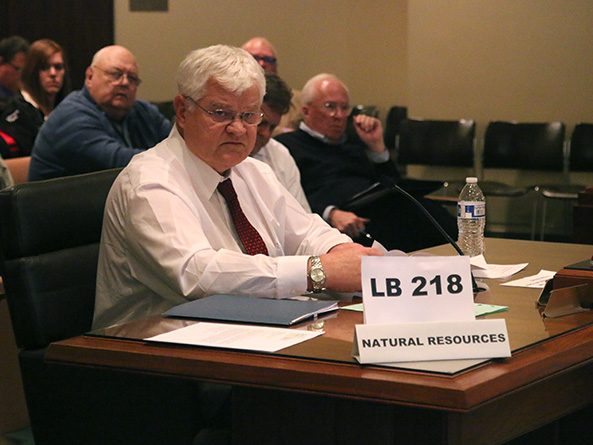Water augmentation project procedures discussed
The Natural Resources Committee heard testimony Feb. 15 on a bill intended to provide oversight of projects that help Nebraska meet its obligations under a multi-state agreement to conserve water in the Republican River Basin.
North Platte Sen. Mike Groene, sponsor of LB218, said the bill is aimed at providing oversight of the N-CORPE (Nebraska Cooperative Republican Platte Enhancement) project, an interlocal agency created in 2012 by four of the state’s natural resources districts.
The project bought 19,500 acres in Lincoln County that it retired from irrigation so that it could pump groundwater into the Republican and Platte rivers to meet streamflow requirements under the compact, which allocates the use of surface water between Colorado, Kansas and Nebraska.
Groene said the bill would establish procedures for similar entities to buy and use land to pump groundwater to augment rivers and streams.
Before pumping water, any future entity would be required to hold a public hearing on the need for the pumping, the governmental use of groundwater and the expected amount and duration of the pumping. After adopting a resolution on those points, the entity could buy land impacted by the pumping for fair market value and install wells and pumps.
Every five years after pumping begins, the entity would be required to hold a public hearing to review the pumping’s effect on nearby landowners, the water table and other factors. After the first five years of pumping, the entity would be required to sell all or part of the land but would retain the irrigation water rights and easements to maintain the wells.
Groene said requiring the sale of N-CORPE’s land to private purchasers would put it back on the county’s property tax rolls. Taking the land out of production reduced Lincoln County’s property tax revenue from approximately $463,000 in 2013 to less than $200,000 in 2016, he said.
“It is our citizens whose natural resource — groundwater — is being mined, lowering our water table and causing farmers near the project concern about their water levels dropping,” Groene said. “It is our citizens who have lost the property tax dollars from productive farmland.”
Bob Peterson of North Platte testified in support of the bill, saying that N-CORPE’s land purchase was not subject to a public hearing. He said the land is suitable for rangeland and dryland farming and grazing cattle. Returning it to the county’s property tax rolls would provide more revenue for local governments and school districts.
“As badly conceived as N-CORPE was, this would be some salvation to it and would help everybody in the community, especially the taxpayers and the residents who live there,” Peterson said. “We desperately need this to keep the community vibrant.”
Also testifying in support was Robert Lundeen, a Lincoln County resident who manages an ethanol plant that used to buy corn grown on the land that was taken out of production. The plant now buys corn from farther away, costing it an additional $125,000 to $150,000 a year, he said. Lundeen said he accepts the necessity of the water conservation agreement that resulted in N-CORPE’s purchase of the land.
“It’s just that we want that land back in private hands, back on the tax base,” he said. “We’re willing to sacrifice the water.”
Jay Schilling of McCook also testified in support of the bill. He said the NRDs rushed into the project in their efforts to comply with the compact.
“With projects of this scope, it is imperative to have a hearing process before making a final decision,” he said. “I am aware that negotiations for land can be time sensitive, but when taxpayer money is at stake, everyone should be allowed to point out the pros and cons.”
The proposed hearings at five-year intervals would be beneficial, Schilling said, by allowing a broader group of agencies to assess the project.
Dr. Jasper Fanning, speaking on behalf of the Nebraska Association of Resources Districts, testified in opposition to the bill. Fanning said the NRDs and the state Department of Natural Resources began the N-CORPE project after they held all public hearings required by law.
He said those who claim the project reduced property tax revenue by removing land from the tax rolls ignore its only alternative: shutting down 60 percent of the basin’s irrigated land through voluntary programs or regulation.
“I don’t agree with the fact that we put undue burden on anyone,” he said. “What they’re failing to realize is that they would only have about half of their irrigated farm left to move forward in the future without a project like this.”
Don Batie, speaking on behalf of the Nebraska Farm Bureau Federation, also testified in opposition to the bill, saying that it seems to allow the severing of groundwater rights from ownership of the overlying land. Water rights would then be treated much like mineral rights, which can be transferred or traded, he said.
“This would represent a major change in Nebraska groundwater law,” Batie said.
The committee took no immediate action on the bill.


